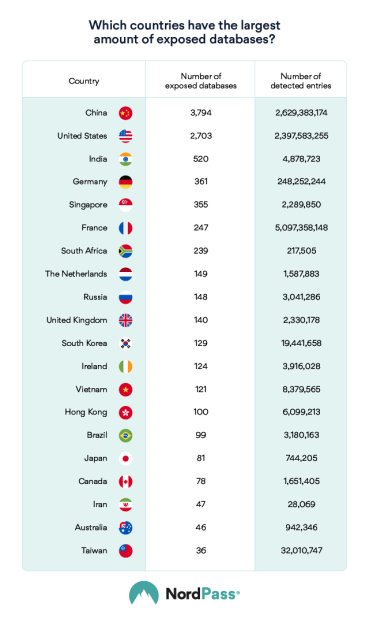10,000 databases with more than 10 billion credentials exposed

John E. Kaye
- Published
- News, Technology

Recently, researchers have identified a total of 9,517 unsecured databases containing 10,463,315,645 entries with such data as emails, passwords, and phone numbers.
The databases were found across 20 different countries, with China being at the top of the list — the country had nearly 4,000 exposed databases. This means that potentially more than 2.6 billion users could have had their accounts breached.
The United States comes second, with nearly 3,000 unsecured databases and almost 2.3 billion entries made available online.
India was third, with 520 unsecured databases and 4,878,723 entries.
Sensitive vs testing data
While some of this data might be useless and only used for testing, much of it could be damaging if exposed. Some of the largest data leaks of last year resulted from exposed databases. For example, millions of Facebook records were exposed on a public Amazon server. In another incident, an unsecured database exposed information of 80 million US households. The data included victims’ addresses, income, and marital status. A rehabilitation clinic in the US also suffered from a data leak, over which nearly 150,000 patients had their personal information exposed. The most worrying part is that this data was not leaked by a persevering hacker — it was simply sitting there in a public database. .
Low-skilled job
While the idea of searching for exposed databases may seem complex, the process itself is quite straightforward. Search engines like Censys or Shodan scan the web constantly and let anyone view open databases in just a few clicks. If the database managers used the default logins, getting into one would be a piece of cake.
“In fact, with proper equipment, you could easily scan the whole internet on your own in just 40 minutes,” says Chad Hammond, security expert at NordPass.
The essentials of database security
Data security and protection should be a top priority. “Every company, entity, or developer should make sure they never leave any database exposed, as this is obviously a huge threat to user data,” says Chad Hammond.
When asked to highlight the main points of database security, the expert emphasised:
“Proper protection should include data encryption at rest, wire (in motion) data encryption, identity management, and vulnerability management.
Data can be exposed to risks both in transit and at rest and therefore requires protection in both states. While there are several different approaches, encryption plays a major role in data protection and is a popular tool for securing data both in transit and at rest.
Nevertheless, all data should be encrypted using trusted and robust algorithms instead of custom or random methods. It’s also important to select appropriate key lengths to protect your system from attacks.
Identity management is another important step and should be used to ensure that only the relevant people in an enterprise have access to technological resources.
Finally, every company should have a local security team responsible for vulnerability management and able to detect any vulnerabilities early on,” says Chad Hammond.
As for the users, the security expert yet again draws attention to the importance of a strong password. “The fact that we have more than 10 billion passwords up for grabs should only encourage people to think of strong, lengthy passwords. If your password is “12345”, no firewall in the world will protect your data. Your password shouldn’t be a dictionary word either — an average person uses only about 20,000-30,000 words, so chances are that all of them are already among those 10 billion,” says the NordPass security expert.
Methodology: NordPass partnered up with a white hat hacker, who scanned elastic search and mongoDB libraries, looking for exposed, unprotected databases. Once found, he logged into those public databases and checked what kind of data could be found there. The white hat hacker has shared with NordPass how many exposed databases and entries he had found. The hacker requested to stay anonymous. Time frame: June 2019 to June 2020.

For more information visit: nordpass.com
For more Technology and Daily news follow The European Magazine
RECENT ARTICLES
-
 Deepfake celebrity ads drive new wave of investment scams
Deepfake celebrity ads drive new wave of investment scams -
 WATCH: Red Bull pilot lands plane on moving freight train in aviation first
WATCH: Red Bull pilot lands plane on moving freight train in aviation first -
 Europe eyes Australia-style social media crackdown for children
Europe eyes Australia-style social media crackdown for children -
 These European hotels have just been named Five-Star in Forbes Travel Guide’s 2026 awards
These European hotels have just been named Five-Star in Forbes Travel Guide’s 2026 awards -
 McDonald’s Valentine’s ‘McNugget Caviar’ giveaway sells out within minutes
McDonald’s Valentine’s ‘McNugget Caviar’ giveaway sells out within minutes -
 Europe opens NanoIC pilot line to design the computer chips of the 2030s
Europe opens NanoIC pilot line to design the computer chips of the 2030s -
 Zanzibar’s tourism boom ‘exposes new investment opportunities beyond hotels’
Zanzibar’s tourism boom ‘exposes new investment opportunities beyond hotels’ -
 Gen Z set to make up 34% of global workforce by 2034, new report says
Gen Z set to make up 34% of global workforce by 2034, new report says -
 The ideas and discoveries reshaping our future: Science Matters Volume 3, out now
The ideas and discoveries reshaping our future: Science Matters Volume 3, out now -
 Lasers finally unlock mystery of Charles Darwin’s specimen jars
Lasers finally unlock mystery of Charles Darwin’s specimen jars -
 Strong ESG records help firms take R&D global, study finds
Strong ESG records help firms take R&D global, study finds -
 European Commission issues new cancer prevention guidance as EU records 2.7m cases in a year
European Commission issues new cancer prevention guidance as EU records 2.7m cases in a year -
 Artemis II set to carry astronauts around the Moon for first time in 50 years
Artemis II set to carry astronauts around the Moon for first time in 50 years -
 Meet the AI-powered robot that can sort, load and run your laundry on its own
Meet the AI-powered robot that can sort, load and run your laundry on its own -
 Wingsuit skydivers blast through world’s tallest hotel at 124mph in Dubai stunt
Wingsuit skydivers blast through world’s tallest hotel at 124mph in Dubai stunt -
 Centrum Air to launch first European route with Tashkent–Frankfurt flights
Centrum Air to launch first European route with Tashkent–Frankfurt flights -
 UK organisations still falling short on GDPR compliance, benchmark report finds
UK organisations still falling short on GDPR compliance, benchmark report finds -
 Stanley Johnson appears on Ugandan national television during visit highlighting wildlife and conservation ties
Stanley Johnson appears on Ugandan national television during visit highlighting wildlife and conservation ties -
 Anniversary marks first civilian voyage to Antarctica 60 years ago
Anniversary marks first civilian voyage to Antarctica 60 years ago -
 Etihad ranked world’s safest airline for 2026
Etihad ranked world’s safest airline for 2026 -
 Read it here: Asset Management Matters — new supplement out now
Read it here: Asset Management Matters — new supplement out now -
 Breakthroughs that change how we understand health, biology and risk: the new Science Matters supplement is out now
Breakthroughs that change how we understand health, biology and risk: the new Science Matters supplement is out now -
 The new Residence & Citizenship Planning supplement: out now
The new Residence & Citizenship Planning supplement: out now -
 Prague named Europe’s top student city in new comparative study
Prague named Europe’s top student city in new comparative study -
 BGG expands production footprint and backs microalgae as social media drives unprecedented boom in natural wellness
BGG expands production footprint and backs microalgae as social media drives unprecedented boom in natural wellness



























